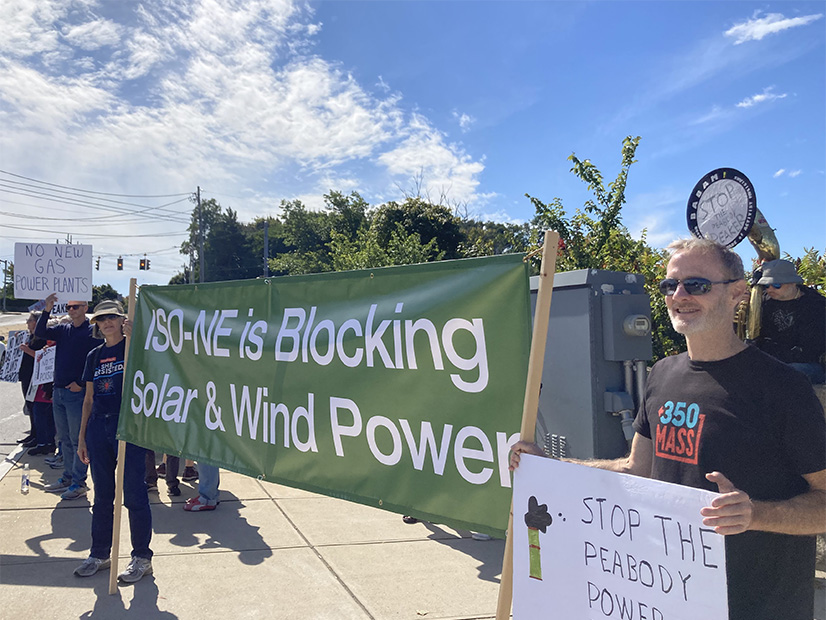
Climate activists from New England are calling on FERC to reject the results of ISO-NE’s Forward Capacity Auction 18, arguing the auction disproportionately favored fossil fuel resources.
Climate activists from New England are calling on FERC to reject the results of ISO-NE’s Forward Capacity Auction (FCA) 18, arguing the auction disproportionately favored fossil fuel resources.
FCA 18 was held in early February and applies to capacity for the 2027/2028 capacity commitment period. The auction procured 31,556 MW of capacity for about $1.3 billion. (See Prices, Renewables Rise in New England Capacity Auction.)
The auction saw some gains for clean energy resources: Battery storage increased from about 3.5 to 6% of the total capacity procured compared to FCA 17, while solar increased from 3 to 4%. For the second auction in a row, no coal resources gained a capacity commitment, foreshadowing the announcement in March that Granite Shore Power will retire the region’s last coal plant by 2028. (See Last Remaining Coal Resources in New England Set to Retire.)
However, the majority of the capacity commitments awarded in FCA 18 still went to fossil resources. Natural gas resources accounted for about 44% of the capacity, while oil generators accounted for about 11%.
In response to these results, activists with the organization No Coal No Gas have submitted comments to FERC arguing the results should be rejected because the auction does not take into account the climate or public health consequences of burning fossil fuels (ER24-1290).
As the states work to rapidly shift away from fossil fuel generation, “a key barrier we face is ISO-NE’s continued reliance upon outdated modes of decision-making that prioritize short-term financial calculus at the expense of long-term strategic thinking,” said Sonja Birthisel, a member of ISO-NE’s Consumer Liaison Group (CLG) and an environmental scientist associated with the University of Maine.
The activists also argued that fossil resources often “don’t perform as advertised” during grid stress events. Nathan Phillips, a professor of ecology at Boston University who also is an elected member of the CLG, pointed to ISO-NE’s findings that 36 generators in New England experienced some form of unplanned outage during Winter Storm Elliott, resulting in 2,277 MW of capacity reductions.
Phillips also wrote that ISO-NE has not tapped into the full potential of demand response resources, which could reduce the need for fossil peaker plants.
“Demand response is the simplest, most cost-effective and reliable solution to peak demand, which ISO-NE ignores with increasingly deafening silence,” Phillips said, adding that demand reductions could help limit need for additional transmission capacity. (See ISO-NE Prices Transmission Upgrades Needed by 2050: up to $26B.)
Responding to the protests, ISO-NE spokesperson Matt Kakley noted more than 2,600 MW of demand resources cleared the auction.
“Demand response can and does participate in all of our wholesale markets,” Kakley said. “Additional participation at the residential level will need to be driven at the state/retail level,” he added, highlighting a New England Conference of Public Utilities Commissioners working group that’s investigating the role of demand response on the grid.
Regarding emissions, Kakley said ISO-NE “has no jurisdiction by which to assess the environmental attributes of different resources.”
He added that ISO-NE has “long recommended carbon pricing as a way to account for environmental factors within the wholesale markets,” but said the RTO would need support from the states to have a chance of FERC approval.
“Thus far, there has not been state support for carbon pricing in the wholesale markets,” Kakley said.
Environmental organizations made similar arguments in 2023 in opposition to the previous FCA. FERC ultimately sided with ISO-NE and approved the results, writing that the protests were “outside the scope of this proceeding because they do not bear on the sole question here — namely, whether ISO-NE conducted FCA 17 in accordance with its own tariff rules” (ER23-1435). (See FERC Accepts Results of ISO-NE FCA 17.)

